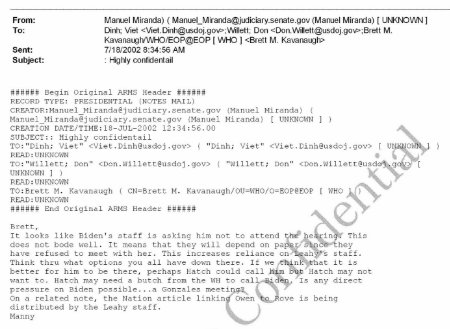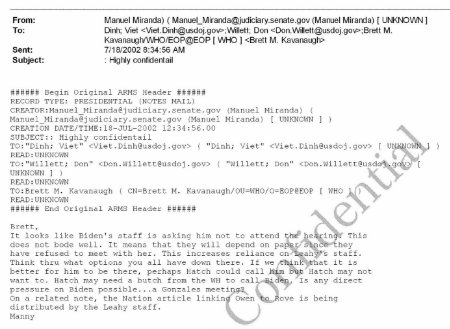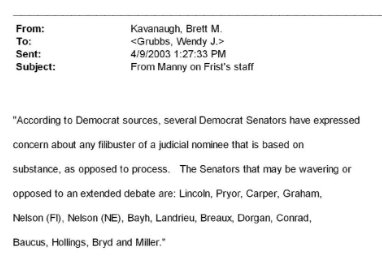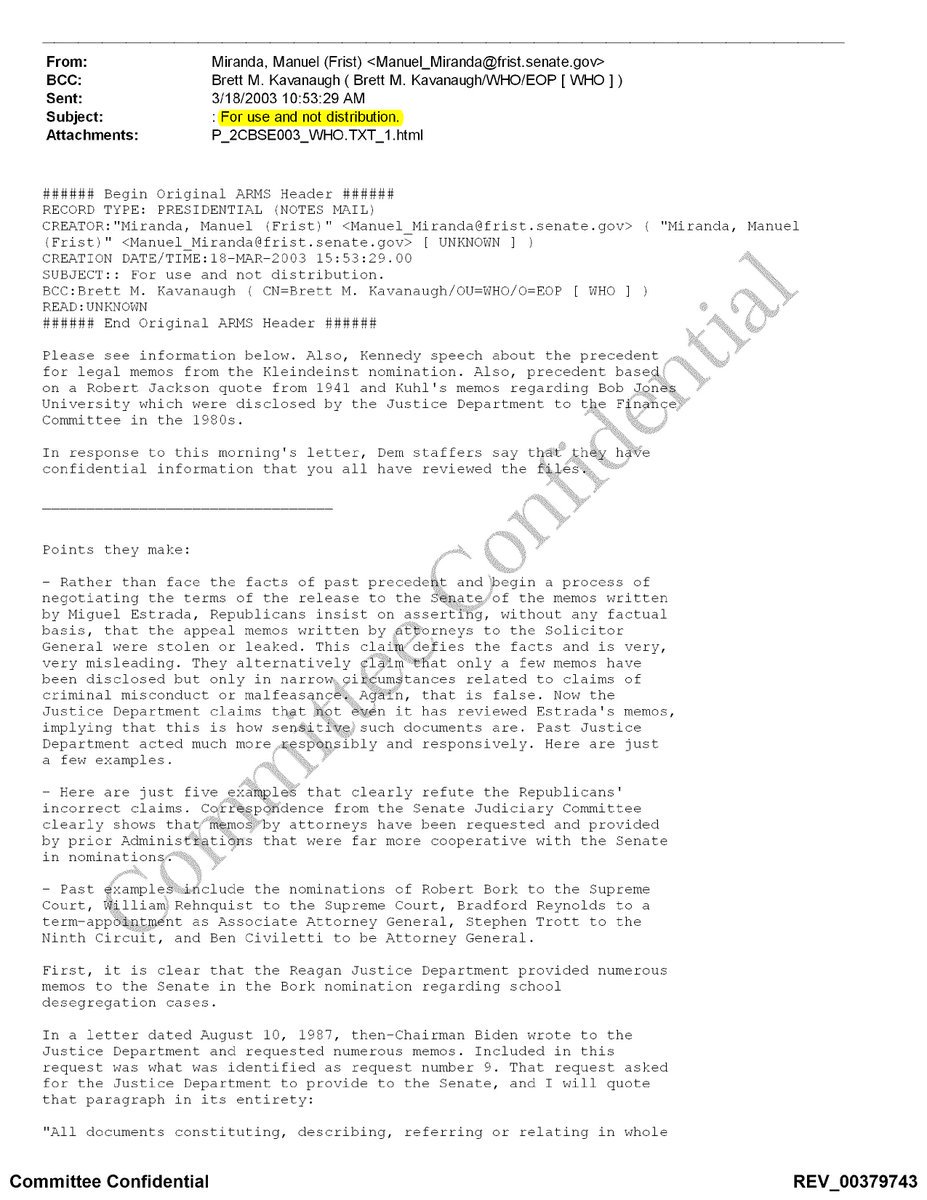THREAD.
1. After I refuted "perjury" claims against Judge Kavanaugh re: his testimony on the Pryor nomination, some asked about the claim that Kavanaugh perjured himself re: #Memogate. So here goes. #SCOTUS #KavanaughHearings #KavanaughConfirmationHearings
1. After I refuted "perjury" claims against Judge Kavanaugh re: his testimony on the Pryor nomination, some asked about the claim that Kavanaugh perjured himself re: #Memogate. So here goes. #SCOTUS #KavanaughHearings #KavanaughConfirmationHearings
2. The #Memogate scandal involved allegedly stolen files from @SenJudiciary Democratic staff. I follow @jadler1969 in calling them "allegedly stolen" (bit.ly/2oOzNra) because Republican ex-staffer Manuel Miranda was never criminally charged.
3. If you don't recall the #Memogate scandal - I can't blame you, it dates back to 2001 - read @charlie_savage (nyti.ms/2CpkkHq), or @jadler1969 (bit.ly/2oOzNra), or @KimberlyRobinsn & @PatrickGregry (bit.ly/2NTwDNF).
4. Another reason to put "stolen" in quotes is because no hacking took place. The files were on a shared server - Repubs could access Dem files, and vice versa - so the "stealing" was really exploiting a glitch. But legality aside, it was unethical and wrong.
5. At his 2004 and 2006 confirmation hearings, and again this week, Judge Brett Kavanaugh testified that although he worked with Manny Miranda on judicial nominations, he (Kavanaugh) never knowingly received "stolen" files.
6. Kavanaugh's critics, including @SenatorLeahy, argue that Kavanaugh knew or should have known he was getting "stolen" files - and some, such as my @ATLblog colleague @ElieNYC, even assert that Kavanaugh perjured himself (bit.ly/2M2uOME).
7. There's no evidence, in recently released emails or elsewhere, showing Kavanaugh had knowledge of Miranda's acts. To the contrary, Miranda told @NYTimes & @WashingtonPost that Kavanaugh "had no knowledge." nyti.ms/2CpkkHq, wapo.st/2wSXnHs
8. Lacking evidence, some have speculated Kavanaugh MUST have known. @SenatorLeahy tweeted out several emails to support this claim. But if you view the individual emails, fairly and without applying hindsight, they don't quite get there.
9. Here's the worst email, subject line "spying," in which Miranda mentions "a friend who is a mole for us on the left." But far from proving Kavanaugh knew of theft, Email #1 suggests he was told the opposite: a Dem staffer was voluntarily sharing info. 

10. In the gossipy, intrigue-filled, often backstabbing worlds of Capitol Hill and D.C., having "moles" in different camps is common (cf. @GameOfThrones). While some might view this as sleazy or unsavory, it's neither uncommon nor illegal.
11. Email #2 is even less incriminating. Miranda passes along info about what the @SenJudiciary Dems are up to, but it sounds like it could easily have been gleaned through backchanneling, Capitol Hill gossip, etc. 

12. The subject line says "highly confidential." As @EdWhelanEPPC tweeted, "Leahy pretends that memo marked 'highly confidential' means that K must have known source. Because we all know that no one in D.C. overmarks things as confidential." 

13. Email #3. Read it without the benefit of hindsight, i.e., not knowing about #Memogate. Would YOU know from the face of this email that Republican @SenJudiciary staffers were improperly accessing Democratic staffers' files through a shared server? 

14. Email #4. Yet again, there's no indication that this info was improperly obtained. With the benefit of hindsight, maybe Kavanaugh SHOULD have interrogated Miranda on how he got such detailed info - but that's a far cry from actual knowledge of theft. 

15. Email #5 from @SenatorLeahy's Twitter feed, which makes much of the "not [for] distribution" subject line. But just because something is marked "not for distribution" doesn't mean it was stolen; it might be so marked for any number of reasons. 

16. Leahy's tweet also claims this email was "8 pages of material taken VERBATIM from my files." But how was Kavanaugh to have known that, since he didn't do the improper accessing? The memo simply presents the info as "Points they [Democrats] make." 

17. This week, Judge Kavanaugh was asked about another email he received, containing a draft letter by @SenJudiciary Democrats - but his response at the time, asking "Who signed this?", shows he didn't realize it was a draft. bit.ly/2Q8XiHH
18. I might have missed a few emails or new ones might emerge, but in each case, ask yourself: would a busy @WhiteHouse lawyer, reading & responding to numerous emails a day on many different subjects, know from the email's face that it contained stolen info?
19. Would it have been great if Brett Kavanaugh had figured out what Manuel Miranda was doing and reported it to the authorities (as Kavanaugh testified he would have, if he had known)? Sure. But that's hindsight.
20. There is no reason to believe Brett Kavanaugh knowingly received stolen information from the #Memogate scandal - and no reason to believe he lied about it, in 2004, 2006, or 2018. #SCOTUS #KavanaughHearings #KavanaughConfirmationHearings
P.S. I tweeted this correction earlier, but I'd like to add it to the thread for the record: as you can see from reading Email #1 (pasted again below), it came from not from Manny Miranda but from a different Senate staffer (Barbara Ledeen). 

• • •
Missing some Tweet in this thread? You can try to
force a refresh




